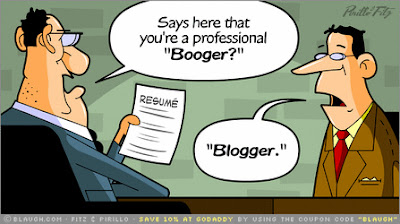How to Write a Dynamic Cover Letter (A Career Services Center Guest Post)
As I read last week’s blog post by Amber Cook about engaging your audience through "reading the room," I thought about the one-page cover letter, a
document that we often don’t think about in academia.
You put so much effort into writing academic papers; how do you make the shift to
writing a one-page cover letter that engages your audience--the hiring manager?
Start by putting yourself in the shoes of a hiring manager
Imagine yourself as a hiring manager. Your goal is to hire
the strongest candidate with the best skills, abilities, talent, and
personality to solve specific problems. You have a stack of 50 applications to
go through to fill an open position. You only have about 15 seconds to glance
at each resume and cover letter and search for key qualifications. It is a
process of elimination.
From the 50 applications, you determine that 25 are
qualified, but you are only going to invite six candidates for an interview.
How do you narrow your pool down to six? You are tired of seeing generic cover
letters with over-used phrases such as “hard worker,” “proven ability,” “team
player,” “excellent communication
skills,” and “track record of success” with no evidence of why these statements
are true, so you eliminate those applications. You are also tired of reading
unorganized paragraphs and seeing spelling and grammatical errors, so applications with those are
out, too.
You are finally down to six candidates to invite for an interview. How did these six candidates craft their cover letters to get your attention?
Here are strategies the candidates followed:
1. Construct
the cover letter as a marketing document tailored to the job description and
qualifications. If the qualifications include excellent communication skills,
give an example of your excellent communication skills such as, “I rewrote the
safety procedures manual and included a hands-on training component for all new
hires. The improvements led to a 30% reduction in accidents over a six-month
period.”
2. Showcase unique skills, abilities, enthusiasm,
and education. Don’t only say, “I am a motivated professional.” Almost everyone
can say that. Instead, describe what motivates and excites you--for example,
“My experience working with individuals with HIV motivated me to pursue my
degree in public health so I can contribute to the prevention of HIV.”
3. Paint a picture; tell a concise story with
examples about who you are as a professional and your accomplishments. Use
strong results-oriented language. For
example, “In my current role as an administrative assistant, I led a team to
streamline the process for tracking employee hours. The new process reduced the
tracking time from 40 hours per month to 30 hours. Our results inspired other
departments to make similar changes.”
4. Organize
your one-page letter with an introduction, a body, and a closing.
5. Use
the language of your profession and maintain a professional tone.
 |
| "giant stack of resumes" by woodlywonderworks (CC by 2.0) Imagine your cover letter within these stacks. Make yours stand out with these strategies. |
For more information on writing cover letters, check out the video and other Career Services Center resources below:
Tips on tailoring your cover letter
How does the academic writing you do help you outside of school? Will your writing skills matter in other contexts? When will you use writing after you graduate? These are some of the questions we're covering this month in our Writing Beyond Academia series. If you're just joining us now, check out our latest WriteCast podcast episode on "How Academic Writing Helps You Beyond Academia" and Amber's post on reading the room.
As always, we welcome your thoughts and questions in the comments. If you have a cover letter success story, we'd love to hear about it!
How does the academic writing you do help you outside of school? Will your writing skills matter in other contexts? When will you use writing after you graduate? These are some of the questions we're covering this month in our Writing Beyond Academia series. If you're just joining us now, check out our latest WriteCast podcast episode on "How Academic Writing Helps You Beyond Academia" and Amber's post on reading the room.
As always, we welcome your thoughts and questions in the comments. If you have a cover letter success story, we'd love to hear about it!
.png)
Never miss a new post; Opt-out at any time
Subscribe to:
Post Comments
(
Atom
)








That's good to see this post.
ReplyDeleteThanks for reading, Gerald!
ReplyDeleteI must say that post is very informative.
ReplyDeleteGreat sample! Thank you!
ReplyDeleteThis is the best guide on how to write a cover letter is this one: https://goo.gl/wqdnD2, cover letters have become so questionable, so it’s great to have a definitive answer of the when/how to use them.
http://waldenwritingcenter.blogspot.in/2015/07/how-to-write-dynamic-cover-letter.html
ReplyDeleteThis is extra-ordinary information. Thanks for sharing mate.
ReplyDeleteThanks so much, Aadil! We appreciate the kind words! Glad you enjoyed this post.
Delete